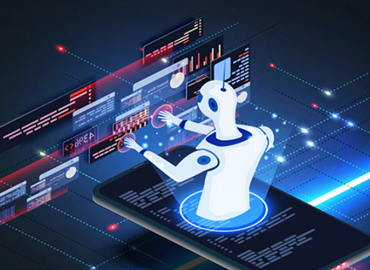The Future of Mobile App Design: AI and Machine Learning
By Sandeep Srivastava
The fields of artificial intelligence (AI) and machine learning (ML) have seen tremendous transformation in recent years, and mobile app design is no different.
These technologies improve mobile applications’ intelligence, intuitiveness, and personalization whileoptimizing the user experience and streamlining the development process.
As we delve into the future of mobile app design, it is crucial to explore how AI and ML shape trends, drive innovation, and transform how we interact with technology on our mobile devices.
The Evolution of AI and Machine Learning in Mobile App Design
AI and ML have come a long way from being buzzwords to becoming integral components of app development. Traditionally, mobile app design was centered around user interfaces (UI) and user experiences (UX), focusing on aesthetics, usability, and functionality.
However, with the advent of AI and ML, app developers now have powerful tools to enhance these aspects further, creating apps that can learn from user behaviors, predict needs, and even automate tasks.
Enhanced User Experience through Personalization
One of the most significant impacts of AI and ML on mobile app design is the ability to deliver highly personalized user experiences. Machine learning algorithms analyze user data, such as preferences, behaviors, and interactions, to tailor content and functionalities to individual users.
For instance, music streaming apps like Spotify and video streaming services like Netflix use AI to recommend content based on user history and preferences, significantly enhancing user satisfaction and engagement.
Predictive Analytics and User Behavior
Machine learning models excel in predictive analytics, allowing developers to foresee user behaviors and trends. By analyzing historical data, AI algorithms can predict user actions, such as the likelihood of making a purchase, churning, or engaging with specific features.
This foresight enables developers to design apps that proactively address user needs, improving retention rates and enhancing user satisfaction.
For example, e-commerce apps utilize predictive analytics to suggest products based on users’ past purchases and browsing history. This not only boosts sales but also creates a more engaging shopping experience.
Augmented Reality (AR) and Virtual Reality (VR)
AR and VR technologies, powered by AI and ML, are set to revolutionize mobile app design by creating immersive and interactive experiences. AR apps overlay digital information onto the real world, enhancing the user’s perception and interaction with their environment.
For example, AR apps in retail allow users to visualize products in their space before purchasing, enhancing the shopping experience and reducing return rates.
VR, on the other hand, offers a fully immersive digital experience. Mobile VR apps are becoming more sophisticated, allowing users to explore virtual worlds, attend virtual events, and engage in interactive experiences.
AI enhances VR by enabling realistic interactions, adaptive environments, and personalized experiences, making virtual worlds more engaging and lifelike.
The Role of AI in Mobile App Development Lifecycle
AI and ML are transforming the mobile app development lifecycle, from ideation to deployment and maintenance. AI-driven development tools can automate code generation, test scripts, and bug detection, significantly reducing development time and costs.
These tools use natural language processing (NLP) to understand developer requirements and generate code snippets, making development more efficient and less prone to errors.
Finally…
AI and ML are not just enhancing mobile app design; they are redefining it. From personalized experiences and predictive analytics to intelligent automation and immersive technologies, these advancements are setting new standards for what mobile apps can achieve.
As we look to the future, the collaboration between human creativity and artificial intelligence will continue to drive innovation, making mobile apps smarter, more intuitive, and more essential to our daily lives.

